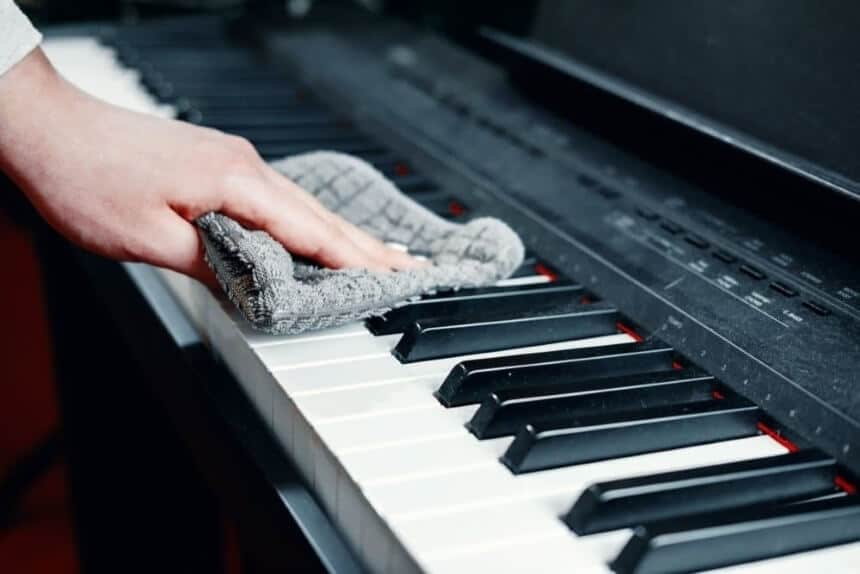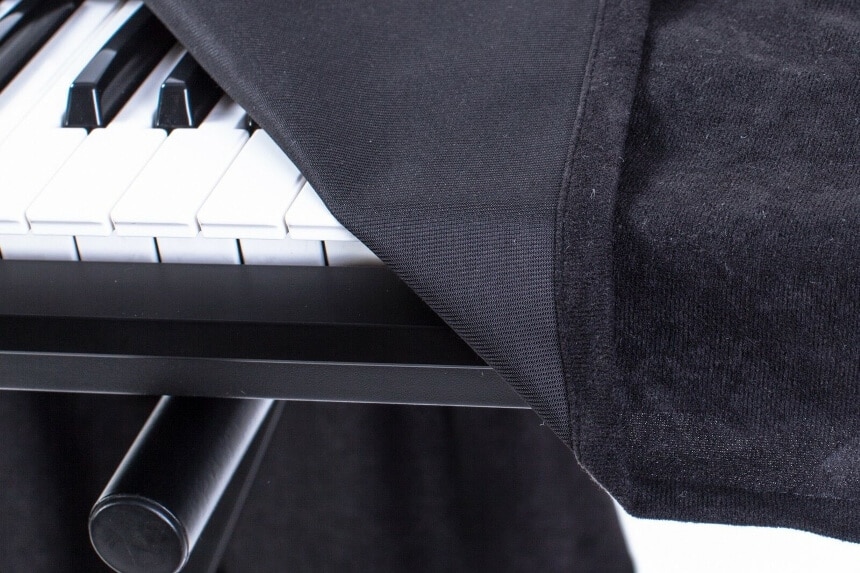A piano is one of the most beautiful instruments in the world. Like all instruments, however, it can get dirty over time and needs cleaning. This is especially true of the keyboard, which is why you need to know how to clean piano keys.
There are a few reasons why keys get dirty, with the main culprits being the oil and grime on our fingertips along with sun exposure. They can develop a layer of grime over time and also start to turn from white to yellow.
In this article, we’ll look at how to keep your keys clean and how to reverse that yellowing process. We’ll also look at what you should avoid doing as some cleaning solutions can make the problem worse. By the end, you should know how to restore your beloved piano to its former glory.
 Piano keys have evolved over time and so have the steps needed to clean them. Wood was the material of choice for most pianos, with the likes of spruce used for lighter keys and ebony for darker keys. This was until it was found that ivory gave a much more appealing look.
Piano keys have evolved over time and so have the steps needed to clean them. Wood was the material of choice for most pianos, with the likes of spruce used for lighter keys and ebony for darker keys. This was until it was found that ivory gave a much more appealing look.
Ivory has since fallen out of fashion, mainly due to the laws banning its use Trusted Source Ivory Trade Is Banned To Save the Elephant The African elephant was classified as an endangered species today in an effort to halt poaching by ivory hunters, who have drastically reduced its numbers. www.nytimes.com due to the hugely negative environmental impact they have. That’s why modern-day pianos almost always use specialized plastic that has the look and feel of ivory.
This plastic is of the highest quality and Yamaha (the maker of some of the best digital grand pianos in the world) have formulated their own plastic called ‘ivorite’, such as seen on their YDP 103 Arius model. These modern-day plastics feel great, look impressive, and are
much more animal-friendly
Trusted Source
Ivory trade - Wikipedia
International trade in Asian elephant ivory was banned in 1975 when the Asian elephant was placed on Appendix One of the Convention on the International Trade in Endangered Species (CITES). By the late 1980s, it was believed that only around 50,000 remained in the wild.
en.wikipedia.org
.
To wipe the keys dry, make sure to get a soft and dry white cleaning cloth. Colored ones have the potential to leave the dye on your keys, which can make the issue worse. The same method is applied to digital or acoustic pianos as all you’ll need is a good microfiber cloth. This will not only life any moisture due also pick up any dust. When wiping keys, make sure to do so vertically as wiping across them risks damage.
 Here are a few steps you need to follow for healthy cleaning of your piano keys:
Here are a few steps you need to follow for healthy cleaning of your piano keys:
These steps should be enough to clean the keys, especially if done regularly. On top of this, you can use a solution such as the Music Nomad MN130 to get rid of those pesky stains. Our tests showed that it was safe on semi-gloss and high-gloss instruments.
Having clean piano keys and fully white piano keys are two different things. Soap and water won’t fully restore their color, but there are homemade solutions that can help. We already mentioned vinegar, but citric acid (such as in lemon juice) can help to bring that whiteness back.
If you have ivory keys, then the process is going to be completely different. You shouldn’t use water at all. Instead, you’ll have two options. There are white vinyl erasers available that can brighten your keys, or you can also use a very fine wire brush. If you have an ivory piano, it may be best to let an expert clean it.
Steps to avoid
While we’ve shown you what you should do, here we’ll have a look at what you should avoid:
 By far, the best thing you can do for your keys is to keep them covered. If you don’t have a lid on your piano, then it’s best to invest in a dust cover. This will keep the sunlight off the keys and block any dust while also protecting anything from falling on them. This will be especially important if you have a portable keyboard piano , as they are more liable to dirt and dust when traveling.
By far, the best thing you can do for your keys is to keep them covered. If you don’t have a lid on your piano, then it’s best to invest in a dust cover. This will keep the sunlight off the keys and block any dust while also protecting anything from falling on them. This will be especially important if you have a portable keyboard piano , as they are more liable to dirt and dust when traveling.
Cleaning piano keys isn’t a complicated process but one that you should take care of. Modern-day plastic keys are highly durable, but even they need cleaning once in a while. The steps we’ve seen here should keep that piano looking at its best for years to come.
For this type, mild soap and water should be all you need when it comes to how to clean piano keys. You can add a mild acid to the mix to brighten them up and remove stubborn spots. Ivory keys need a bit more care, but these are now very rare.
All you need to do now is follow these steps and don’t cut corners. You’ll soon have your instrument looking as it should and playing perfectly too.